
LUNG
Scope & Guideline
Exploring the complexities of lung diseases for better patient outcomes.
Introduction
Aims and Scopes
- Cardiovascular and Pulmonary Interactions:
Research articles frequently explore the relationship between cardiovascular diseases and pulmonary conditions, emphasizing the bidirectional nature of these health issues. - Rehabilitation and Patient Outcomes:
The journal emphasizes studies on rehabilitation techniques and their effects on patient outcomes, particularly in populations with heart failure and chronic obstructive pulmonary disease (COPD). - Innovative Therapeutic Approaches:
A core focus is placed on novel therapeutic strategies, including medication, non-invasive ventilation, and advanced cardiac support technologies like left ventricular assist devices. - Systematic Reviews and Meta-Analyses:
The journal prioritizes comprehensive reviews that synthesize existing literature to provide evidence-based guidelines for clinical practice. - Health Disparities and Patient Perspectives:
There is a consistent focus on exploring health disparities, patient experiences, and psychosocial dimensions of care, aiming to inform better healthcare practices.
Trending and Emerging
- Telehealth and Remote Monitoring:
There is a growing trend towards exploring telehealth interventions and remote patient monitoring, particularly for heart failure and COPD management, driven by the necessity for innovative care models during and after the COVID-19 pandemic. - Impact of COVID-19 on Cardiopulmonary Health:
Many recent studies focus on the long-term effects of COVID-19 on lung and cardiovascular health, including post-acute sequelae and the implications for rehabilitation and care. - Multidisciplinary Approaches to Care:
Research increasingly emphasizes the importance of multidisciplinary strategies in managing complex conditions, integrating various healthcare providers to enhance patient outcomes. - Health Equity and Social Determinants of Health:
Emerging research is placing greater emphasis on health equity, studying how social determinants impact health outcomes in lung and cardiovascular diseases, particularly in underserved populations. - Psychosocial Factors in Disease Management:
There is an increasing focus on the role of psychosocial factors, such as mental health and caregiver experiences, in the management and outcomes of patients with chronic diseases.
Declining or Waning
- Traditional Diagnostic Approaches:
There has been a noticeable decrease in studies focusing on conventional diagnostic methods for pulmonary diseases, as newer technologies and biomarkers gain prominence. - Basic Science Research:
Research that delves into fundamental biological mechanisms underlying lung and heart diseases has become less frequent, with a shift towards clinical applications and outcomes. - Pharmacological Interventions:
The volume of papers centered on traditional pharmacological treatments has waned, possibly due to the rise of personalized medicine and non-pharmacological interventions. - Longitudinal Studies:
The prevalence of longitudinal studies examining chronic disease progression has declined, with a growing emphasis on acute care and immediate interventions.
Similar Journals
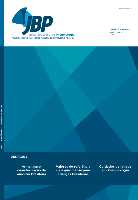
Jornal Brasileiro de Pneumologia
Connecting researchers for a healthier tomorrow in respiratory care.Jornal Brasileiro de Pneumologia is a pivotal open-access journal in the field of Pulmonary and Respiratory Medicine, published by SOC BRASILEIRA PNEUMOLOGIA TISIOLOGIA. Established in 2004, this esteemed publication has become a significant platform for researchers, health professionals, and students in Brazil and beyond, facilitating the exchange of innovative ideas and vital research findings. The journal is indexed in Scopus and is recognized in the 2023 category quartiles as Q3, ranking 86 out of 155 in its field with a corresponding 44th percentile. This reflects its growing influence and commitment to advancing knowledge concerning respiratory health. With a mission to disseminate high-quality research, the journal aims to foster advancements in clinical practice and improve outcomes in pulmonary diseases, making it an essential resource for those dedicated to enhancing the quality of care in respiratory medicine. For those seeking comprehensive access to critical studies and reviews in this domain, the Jornal Brasileiro de Pneumologia remains an invaluable asset.

THORAX
Championing excellence in respiratory research.THORAX is a premier academic journal dedicated to advancing knowledge in the field of Pulmonary and Respiratory Medicine. Published by the esteemed BMJ Publishing Group in the United Kingdom, this journal has been a pivotal resource for researchers and clinicians since its inception in 1946. With a remarkable ranking of #6 out of 155 in its category, THORAX holds a prestigious position within the top 4% of its field, as indicated by its 2023 Q1 quartile classification and a strong Scopus ranking. The journal focuses on publishing high-quality research, reviews, and clinical studies that are essential for understanding respiratory diseases and their management. Although it is not an open-access journal, THORAX provides vital contributions to the academic community, fostering dialogue and innovation in pulmonary medicine. As it approaches its converged years, concluding in 2024, researchers, professionals, and students are encouraged to explore its rich repository of knowledge, while engaging with the most current advancements in the field.
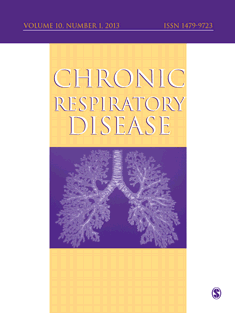
Chronic Respiratory Disease
Fostering collaboration in respiratory health advancements.Chronic Respiratory Disease is a leading peer-reviewed journal dedicated to advancing the field of pulmonary and respiratory medicine. Published by SAGE Publications Ltd since its inception in 2004, this open-access journal has been at the forefront of disseminating high-quality research aimed at addressing chronic respiratory conditions. With an impressive impact factor and classified as Q1 in the 2023 category of Pulmonary and Respiratory Medicine, it ranks an admirable #45 out of 155 in Scopus, placing it in the 71st percentile of its field. This journal features a diverse range of studies, reviews, and clinical insights that cater to researchers, healthcare professionals, and students alike, encouraging the exchange of innovative ideas and practices in respiratory disease management. Operating out of London, UK, Chronic Respiratory Disease exemplifies a commitment to openness, having transitioned to open access since 2017, thereby ensuring that pivotal research is readily accessible to a global audience engaged in the improvement of respiratory health.

Turkish Thoracic Journal
Transforming the landscape of pulmonary medicine, one study at a time.Turkish Thoracic Journal, published by AVES, is a prominent open-access platform dedicated to advancing the field of pulmonary and respiratory medicine. Since its establishment, the journal has aimed to disseminate significant research findings, clinical studies, and reviews that contribute to an improved understanding of respiratory health challenges, with a particular focus on the Turkish context and regional issues. With an E-ISSN of 2149-2530 and transitioning to open access in 2022, the journal enhances visibility and accessibility, inviting a global audience of researchers, clinicians, and students to engage with the latest scientific work. The Turkish Thoracic Journal has been indexed in major databases, although it faced a coverage discontinuation in Scopus between 2016 and 2022. Currently positioned within the 23rd percentile among its peers in the field, it invites submissions that explore innovative approaches to thoracic health, enriching the discourse in a vital area of medicine.

Pulmonary Medicine
Driving Progress in Pulmonary and Respiratory SciencePulmonary Medicine, published by HINDAWI LTD, stands as a prestigious open-access journal since 2010, dedicated to advancing the field of pulmonary and respiratory medicine. Located in Egypt, this journal is indexed with an ISSN of 2090-1836 and an E-ISSN of 2090-1844, and it has attained a commendable Q2 ranking in both the miscellaneous medicine and pulmonary health categories, indicative of its significant impact and quality. With an impressive Scopus ranking of #15 out of 155 in the pulmonary and respiratory medicine category, the journal is positioned in the 90th percentile, highlighting its relevance and contribution to ongoing research. The journal aims to publish high-quality original research, reviews, and clinical studies that address pressing issues in pulmonary health, making it a vital resource for researchers, clinicians, and students seeking to enhance their understanding and practice in respiratory medicine. By embracing an open-access model, Pulmonary Medicine provides a platform for disseminating knowledge, fostering collaboration, and driving innovation within the global scientific community.
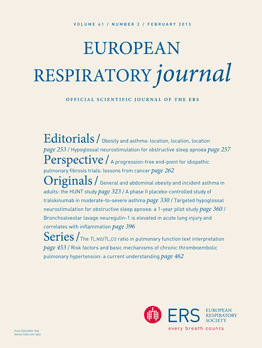
EUROPEAN RESPIRATORY JOURNAL
Shaping the Future of Respiratory CareThe EUROPEAN RESPIRATORY JOURNAL, published by EUROPEAN RESPIRATORY SOC JOURNALS LTD, is at the forefront of advancing knowledge in the fields of pulmonary and respiratory medicine. With its ISSN 0903-1936 and E-ISSN 1399-3003, this esteemed journal has established itself as a leading platform since its inception in 1988, currently converging towards 2024. Ranked in the Q1 category for both Medicine (miscellaneous) and Pulmonary and Respiratory Medicine in 2023, it stands as the 3rd of 155 journals in its field, reflecting an impressive 98th percentile Scopus ranking. The journal boasts a rigorous selection of peer-reviewed articles that encompass innovative research, clinical studies, and reviews, thereby enhancing the understanding and treatment of respiratory diseases. Although it does not currently offer an Open Access option, the journal remains crucial for researchers, clinicians, and healthcare professionals committed to improving respiratory health across Europe and beyond. Join a community dedicated to groundbreaking research and advancements in respiratory medicine.
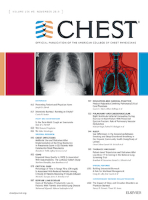
CHEST
Elevating the standards of pulmonary medicine research.CHEST is a premier journal published by Elsevier, focusing on the vital fields of cardiology, critical care, and pulmonary medicine. Established in 1970, this esteemed journal has continually provided authoritative research, reviews, and clinical studies, catering to a global audience of healthcare professionals, researchers, and students. With an impressive impact factor, CHEST ranks in the top quartile (Q1) across its core categories according to the latest Scopus metrics, securing its position as a leading resource within cardiology (Rank #16), pulmonary (Rank #9), and critical care (Rank #8). Published quarterly, it offers a wealth of knowledge essential for advancing understanding and improving patient outcomes in these critical areas of healthcare. Researchers and practitioners are encouraged to submit their work, contributing to the ongoing discourse that shapes innovative practices and policies in respiratory and cardiovascular health.
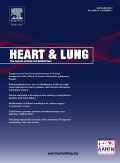
HEART & LUNG
Advancing Knowledge in Heart and Lung HealthHEART & LUNG is a premier academic journal published by MOSBY-ELSEVIER, focusing on the critical intersections of cardiology, critical care, and respiratory medicine. Since its inception in 1973, the journal has established a significant reputation within the medical community, as evidenced by its impressive Q2 ranking in key categories such as Cardiology and Cardiovascular Medicine, Critical Care and Intensive Care Medicine, and Pulmonary and Respiratory Medicine for the year 2023. With a dedicated readership comprising researchers, healthcare professionals, and students, HEART & LUNG serves as a vital platform for disseminating cutting-edge research, clinical innovations, and comprehensive reviews that influence practice standards and enhance patient care. While it currently does not offer Open Access options, readers can access a wealth of information pivotal to the advancement of medical knowledge and practice through conventional subscription. Explore the latest findings and contribute to the ever-evolving landscape of cardiovascular and respiratory health through this esteemed journal.
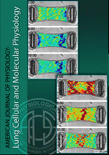
AMERICAN JOURNAL OF PHYSIOLOGY-LUNG CELLULAR AND MOLECULAR PHYSIOLOGY
Fostering breakthroughs in lung cellular and molecular research.AMERICAN JOURNAL OF PHYSIOLOGY-LUNG CELLULAR AND MOLECULAR PHYSIOLOGY, published by the American Physiological Society, stands as a prominent peer-reviewed journal dedicated to advancing the field of lung cellular and molecular physiology. With an impressive impact factor, the journal serves as a crucial platform for disseminating high-quality research focused on the intricate mechanisms underlying pulmonary function and disease. Established in 1989, this journal has consistently ranked within the top quartiles across various categories, including Q1 in Physiology and Pulmonary and Respiratory Medicine, highlighting its significance in the scientific community. The journal covers a wide scope of topics pertinent to cell biology and physiology, catering to the needs of researchers, professionals, and students seeking to explore and contribute to this vital area of study. Although currently not offering open access, it provides comprehensive access options for subscribers, ensuring that vital research is communicated effectively to the global scientific community. With a commitment to fostering innovation and inspiring future studies, the AMERICAN JOURNAL OF PHYSIOLOGY-LUNG CELLULAR AND MOLECULAR PHYSIOLOGY remains an essential resource for those engaged in lung research.
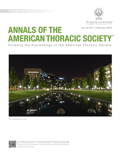
Annals of the American Thoracic Society
Elevating clinical practice through impactful research and methodologies.Annals of the American Thoracic Society is a premier journal dedicated to advancing the field of pulmonary and respiratory medicine. Published by the American Thoracic Society, this journal offers an invaluable platform for researchers and clinicians to disseminate cutting-edge research, clinical insights, and innovative methodologies. With an impressive impact factor and ranked in the top Q1 category of its field (2023) and within the top 20 of 155 according to Scopus rankings, it is positioned as a leading force in shaping clinical practice and research directions. The journal's convergence years from 2013 to 2024 indicate a commitment to providing timely and relevant content at the forefront of pulmonary health. While not an open-access journal, it ensures broad accessibility to its significant contributions in respiratory medicine, making it an essential resource for professionals, researchers, and students alike endeavoring to deepen their understanding and improve outcomes in thoracic health.